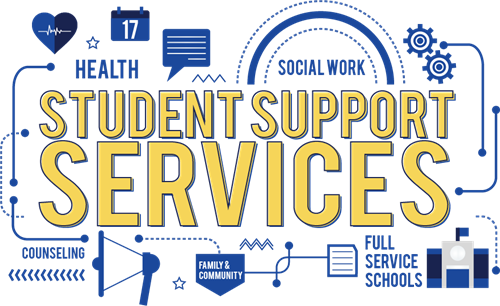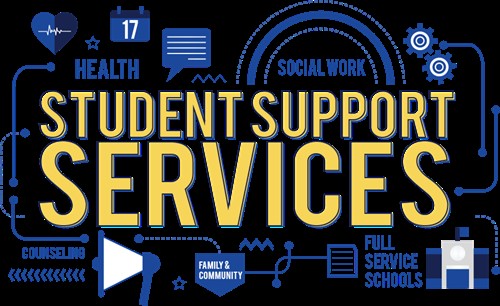College and university life can be challenging and overwhelming, but student support services play a vital role in helping students succeed academically, socially, and personally. These services provide guidance, mentorship, tutoring, mental health resources, financial aid support, and career counseling, ensuring that students have access to the tools they need to thrive.
From first-generation college students to those struggling with coursework or mental health concerns, student support services offer personalized assistance to help students stay on track and achieve their educational goals.
In this guide, we will explore:

- What are student support services, and why are they important?
- Types of student support services available on college campuses.
- How to access and utilize these services effectively.
- The impact of student support services on academic and personal success.
- Tips for making the most of student resources.
What Are Student Support Services?
Student support services are on-campus and online resources designed to help students navigate the challenges of college life. These services focus on academic success, mental health, financial aid, career planning, and personal development.
📌 Why They Matter:
- Improve academic performance through tutoring and study workshops.
- Enhance mental health and well-being through counseling and support groups.
- Provide career guidance through internships and job placement assistance.
- Help students stay in school by offering financial aid and mentoring programs.
📌 Example: A student struggling with math can receive free tutoring, while another dealing with stress can access mental health counseling on campus.
Types of Student Support Services
1. Academic Support Services 📖
- Tutoring Centers – Provides free tutoring for subjects like math, science, and writing.
- Study Skills Workshops – Helps students improve time management, note-taking, and test preparation.
- Writing Centers – Offers feedback on essays, research papers, and resumes.
- Academic Advising – Guides students in course selection, graduation planning, and degree requirements.
📌 Example: A student struggling with time management can attend a study skills workshop to learn effective strategies.
2. Mental Health and Wellness Services 🧠💙
- Counseling Services – Provides free or low-cost therapy sessions for students dealing with stress, anxiety, depression, or personal issues.
- Health and Wellness Programs – Includes mindfulness workshops, stress management techniques, and mental health awareness events.
- Support Groups – Offers a safe space for students dealing with grief, trauma, or identity-related challenges.
- Disability Support Services – Ensures accommodations for students with learning disabilities, physical disabilities, or mental health conditions.
📌 Example: A student experiencing anxiety before exams can schedule a session with a campus counselor for coping strategies.
3. Financial Aid and Scholarship Assistance 💰
- FAFSA and Financial Aid Guidance – Helps students apply for grants, loans, and scholarships.
- Emergency Financial Assistance – Provides short-term financial relief for students facing unexpected expenses.
- Scholarship Workshops – Assists students in finding and applying for scholarships.
- Work-Study Programs – Offers on-campus jobs to help students earn money while studying.
📌 Example: A student struggling with tuition costs can seek financial aid advising to explore grant opportunities.
4. Career and Internship Services 🎓💼
- Career Counseling – Helps students explore career options, build resumes, and prepare for job interviews.
- Internship and Job Placement Programs – Connects students with internships, co-op programs, and job opportunities.
- Networking Events and Career Fairs – Provides connections to employers and industry professionals.
- LinkedIn and Resume Workshops – Assists students in creating strong professional profiles.
📌 Example: A student interested in marketing can attend a career fair to connect with potential employers and internship providers.
5. Diversity, Inclusion, and Cultural Support 🌍
- Multicultural Student Centers – Offers safe spaces for students of diverse backgrounds.
- LGBTQ+ Support Services – Provides mentorship, counseling, and resources for LGBTQ+ students.
- First-Generation Student Programs – Assists students who are the first in their families to attend college.
- International Student Services – Helps international students with visa guidance, housing, and cultural adjustment.
📌 Example: A first-generation student can find mentorship programs to navigate college life more confidently.
6. Student Engagement and Extracurricular Activities 🎭⚽
- Clubs and Student Organizations – Encourages students to join campus groups based on interests and career goals.
- Leadership Development Programs – Helps students develop public speaking, teamwork, and organizational skills.
- Athletics and Fitness Centers – Promotes a healthy lifestyle through sports and gym facilities.
- Volunteer and Community Service Opportunities – Engages students in service projects and outreach programs.
📌 Example: A student interested in activism can join a student government association to develop leadership skills.
How to Access and Utilize Student Support Services
1. Visit the Student Services Office 🏛️
Most campuses have a Student Success Center or Student Services Office that provides guidance on available resources.
Ask about academic support, mental health counseling, financial aid, and career services.
2. Explore Online Resources 🌐
Many colleges offer virtual support services, including online tutoring, career counseling, and telehealth therapy.
Check the college’s website for scholarship applications, student handbooks, and important deadlines.
3. Attend Orientation and Campus Events 🎉
Orientation sessions introduce available student services and how to access them.
Career fairs, wellness workshops, and student panels offer networking and learning opportunities.
4. Connect with Professors and Advisors 👩🏫
Professors can recommend tutoring services, research opportunities, and internships.
Academic advisors help students plan coursework, change majors, and graduate on time.
5. Join Student Organizations and Peer Groups 👥
Being part of study groups, mentoring programs, or leadership clubs enhances academic and personal development.
📌 Pro Tip: Taking advantage of student resources early can prevent academic struggles and improve overall college success!
The Impact of Student Support Services on Academic Success
- Higher Graduation Rates – Students who use tutoring and advising graduate at higher rates.
- Improved Mental Health – Access to counseling reduces stress and burnout.
- Better Career Readiness – Career services help students secure jobs before graduation.
- Stronger Academic Performance – Tutoring and study workshops boost GPA and retention.
📌 Example: Research shows that students who engage in academic advising and tutoring are more likely to complete their degrees compared to those who don’t use these services.
Tips for Making the Most of Student Support Services
- Don’t Wait Until You’re Struggling – Seek help before you fall behind.
- Use Multiple Services – Combine academic, career, and wellness resources for holistic success.
- Stay Connected – Regularly meet with advisors, professors, and mentors.
- Take Advantage of Free Resources – Many services are included in tuition fees, so don’t miss out!
📌 Final Thought: Using student support services is not a sign of weakness—it’s a smart strategy for success!
Conclusion: Your Path to Academic and Personal Success 🎓
Student support services exist to help students succeed in all aspects of college life. From tutoring and career planning to mental health counseling and financial aid knowledge, these resources provide essential guidance and support.
By proactively using student services, students can overcome challenges, stay motivated, and achieve their academic and career goals.
💬 Have you used student support services? What resources have helped you the most? Share your experience below! 📚💡🔥



